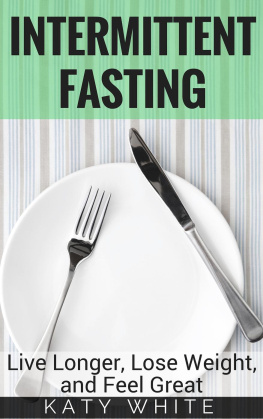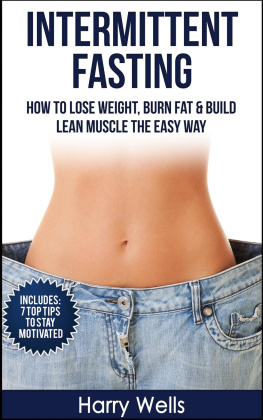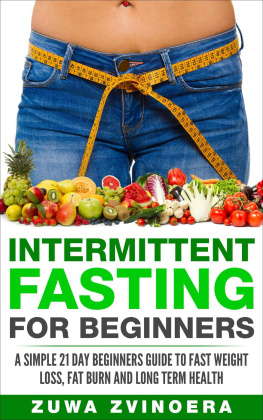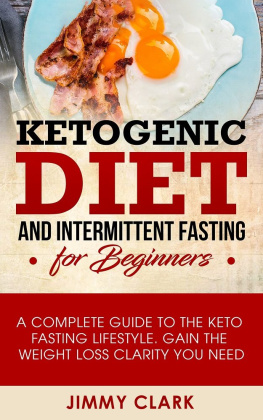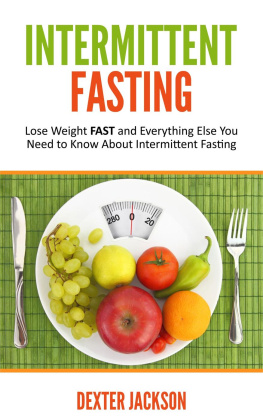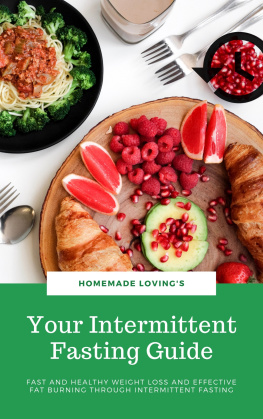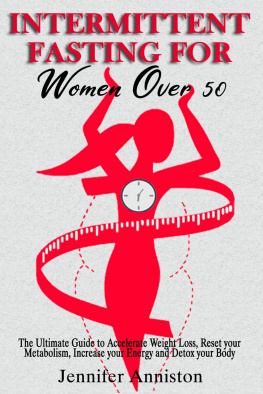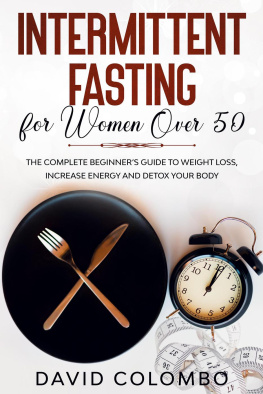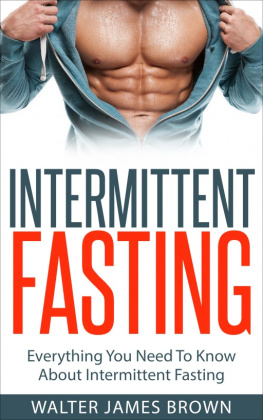Intermittent Fasting: Live Longer, Lose Weight, and Feel Great
By Katy White
2015
All rights reserved. No part of this publication may be reproduced, distributed, or transmitted in any form or by any means, including photocopying, recording, or other electronic or mechanical methods, without the prior written permission of the publisher, except in the case of brief quotations embodied in critical reviews and certain other noncommercial uses permitted by copyright law.
Also by Katy White
Intermittent Fasting: Live Longer, Lose Weight, and Feel Great
Intermittent Fasting: Live Longer, Lose Weight, and Feel Great
Are you tired of trying a different diet every month? Have you tried eating small meals throughout the day, or maybe 3 big meals per day? Have you cut carbs, cut fat, cut sugar, and more? Are you still not meeting your healthy living and weight-loss goals?
With Intermittent Fasting, you can say goodbye to all of these problems and say hello to the healthy life and body youve always wanted!
In this book, you'll find out what intermittent fasting is, how it works, what benefits you can expect, and how to get started right away! All the different methods of intermittent fasting are included so you can easily try out different methods and select the one that suits your lifestyle best.
This book is your complete guide to Intermittent Fasting. You can get started right away and jump-start your healthy lifestyle and weight loss journey today!
Intermittent Fasting
It is the new craze in dieting. And its not even really dieting. It is called Intermittent Fasting. Have you heard of it? It basically means you fast for an extended period of time. Say you fast through your sleep, which you do already, if you do not eat in your sleep. Now, if you extend the time until you eat for a few more hours, you are Intermittent Fasting. Intermittent Fasting means to be more conscious of your fasting and feeding schedule. It really is not as hard as it sounds, and the results can be incredible!
Is dieting hard? Yes, there is no doubt about it. It is extremely hard to worry about eating too much each and every day. I constantly worry about what I am going to have for dinner the next day and pray that I do not end up in bed starving! Now that is a nightmare. Plus, you are riddled with guilt when you eat something with as many carbs as a bagel. It haunts you sometimes, does it not? Or maybe there is a day when someone brings donuts to the office and you just need to have one because you have not eaten anything delicious in weeks. Do not worry. This is not a problem with Intermittent Fasting! Dieting can be easy!
No, I am not kidding. Dieting can be easy. Look, I said it again. How? Let me tell you about Intermittent Fasting. You may have heard of people fasting when they give something up for a period of time or refrain from eating within a certain window, like during Ramadan or Lent. It is essentially the same idea. Intermittent Fasting is about refraining from eating during a specific time frame.
Wait! It is actually much easier than it sounds. Essentially, we all fast when we sleep. Unless you have a habit of sleep walking to the fridge and then eating in your sleep, you generally fast during your sleep. That is why the first meal of the day is called "breakfast" because you are breaking your fast. If you sleep 8 hours, you will most likely have fasted at least 8 hours, if not more, depending on when you eat your last meal and when you eat your first meal. That does not sound so bad, now, does it?
For years we have been pounded with the idea that we need to eat at certain times, and if we miss that window, our metabolism will go down. Well, recent studies have proven that to be completely incorrect. The only true and accepted rule of dieting is that the calories in have to be less than calories out. That is how you lose weight, period. There are no magic methods. This is your equation. The amount of calories that you consume has to be less than you use up! It is a simple enough math problem, but sometimes, you can make this equation easier.
Intermittent Fasting is one of those ways.
If you feel skeptical about Intermittent Fasting because scientists have jammed into our brains the need to eat consistently throughout the day, then note this: cavemen would fast during periods of times when food was scarce. Yes, just like the paleo diet, Intermittent Fasting has roots in our caveman history. Perhaps we have been spoiled by our ability to access food on a regular basis or maybe it is the fact that scientists have scared us with tales of metabolic damage. Wherever the fear comes from, we need to understand that it is perfectly fine for us to consume low levels of calories for a prolonged period of time. Not only is it fine, it can be downright healthy!
I think it is most definitely time to stop accepting theories as truth and explore what truly works in our own lives! Your metabolism will not be destroyed because you wait a few hours to eat. You do not have to eat every 3 hours. Eating after 7 oclock at night will not make you gain weight. Carbohydrates do not make you gain weight!
Wait! Do not run! I am being serious here. All of the rules of weight loss that you have been told for years do not need to be followed anymore. Why should you follow these rules? Forget them. Make dieting easier with Intermittent Fasting. Intermittent Fasting is not about rules. Intermittent Fasting is just about structure, and it helps to make your life just a bit easier. Trade in all of the rules that have ruled over you!
Now, let us get down to the nitty gritty! There are a few ways to do Intermittent Fasting, but first, let us look at the benefits versus the negatives!
Positive Effects
T here have been studies done on the effects of Intermittent Fasting. One positive aspect of practicing Intermittent Fasting seems to be a heightened insulin sensitivity, which can later prove to be quite useful in combating diabetes and maintaining a healthy weight. Other benefits may include detoxification of the liver, higher growth hormone levels, and decreased inflammation depending on your preferred method of Intermittent Fasting.
For those who practice Intermittent Fasting, they may find themselves eating significantly less during their eating window. For those who desire to gain muscle, they may find consuming massive amounts of food more difficult so the amount of fat gained during their bulking phase is decreased because they are not eating massive amounts of food to gain as much muscle as possible. This results in lean muscle gain. Dont worry, well explain this more later.
As long as you consume more than the amount of calories you need, you can build muscle, but if it is hard to eat a certain amount, you will definitely not be gaining as much fat as you usually would if you were to consume a large amount of food variously throughout the day. There are a lot of people who bulk by eating massive amounts of food. Guess what that means. Lots of fat gain! Intermittent Fasting can help limit that massive amount of fat gain for those who are going through their bulking phase. Intermittent Fasting has so much use for everyone!
You can also look forward to increased cellular repair and growth, blood sugar control, and fat burning. That sounds great, right? Intermittent fasting has all sorts of benefits to look forward to.
However, what are the negatives? Let us find out together!
Negative Effects
T he negative effects of Intermittent Fasting generally depend on the individual because everyone's body responds a little differently. For example, I would not recommend Intermittent Fasting for anyone who suffers from acid reflux. You need to eat in the morning so that you do not end up in pain the entire day. Why would I ask you to torture yourself? I wouldnt, of course. However, not everyone has acid reflux, of course, so you see, everyone has a different set of circumstances.
Next page
